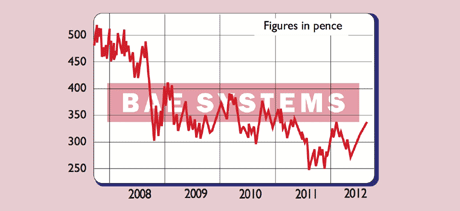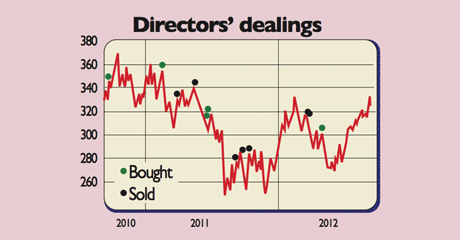Shares in focus: Can BAE Systems protect your wealth?
BAE Systems pays a chunky dividend. But faced with economic headwinds, should you still buy shares in the global defence company? Phil Oakley investigates.
Get the latest financial news, insights and expert analysis from our award-winning MoneyWeek team, to help you understand what really matters when it comes to your finances.
You are now subscribed
Your newsletter sign-up was successful
Want to add more newsletters?

Twice daily
MoneyWeek
Get the latest financial news, insights and expert analysis from our award-winning MoneyWeek team, to help you understand what really matters when it comes to your finances.

Four times a week
Look After My Bills
Sign up to our free money-saving newsletter, filled with the latest news and expert advice to help you find the best tips and deals for managing your bills. Start saving today!
Economic headwinds are proving too strong for the global defence company, says Phil Oakley.
The business
BAE Systems is a global defence, aerospace and security company and one of the world's biggest suppliers of defence equipment and services. It designs and produces equipment for military customers around the world, including combat aircraft and vehicles, naval ships, and nuclear submarines. These products are backed with support services such as maintenance and training programmes.
The company's electronics business sells flight and engine control systems to commercial and military customers along with other products, such as night vision systems. BAE Systems is expanding its cyber-security and intelligence business, which provides governments with products for fighting terrorism and money laundering and businesses with information security. The group had sales of £16.6bn in 2011.
MoneyWeek
Subscribe to MoneyWeek today and get your first six magazine issues absolutely FREE

Sign up to Money Morning
Don't miss the latest investment and personal finances news, market analysis, plus money-saving tips with our free twice-daily newsletter
Don't miss the latest investment and personal finances news, market analysis, plus money-saving tips with our free twice-daily newsletter
The history
The company can trace its roots back to 1560 when the Royal Gunpowder Factory was established at Waltham Abbey in Essex. It is also linked with many revolutionary products such as the Vickers machine gun, Spitfire aircraft, Comet commercial jets and the Harrier jet.
British Aerospace formally came into being in 1977 with the merger of British Aircraft Corporation, Hawker Siddeley and Scottish Aviation. The firm was then privatised by the Thatcher government in 1981. The mid-1980s saw the company embroiled in an enormous scandal over sales of arms to Saudi Arabia. At that time it was also expanding its business by buying companies such as car-maker Rover.
The 1990s saw it increase its stake in the Airbus commercial aircraft venture and join the American joint strike fighter programme. In 1999 it merged with GEC Marconi Electronic Systems to become BAE Systems. The 2000s saw BAE Systems spend billions buying companies specialising in land armoured vehicles. It also benefited from higher military spending by governments.
In 2010, it agreed to pay fines of £287m after being accused of corrupt activities relating to arms contracts in Saudi Arabia, eastern Europe and Africa. The recession has hit the fortunes of its defence business as governments cut back on military spending. This has seen BAE Systems diversify by buying cyber-security and intelligence companies.
The chief executive
Ian King has been chief executive since 2008. It has been a challenging four years for him. He has had to force through thousands of job cuts as defence spending has been slashed. At the same time he has been charged with rebuilding the company's tarnished reputation. He took home £2.4m last year.
Should you buy the shares?
Trading on a low p/e ratio and paying a chunky dividend, surely BAE shares are a classic value investment? We're not so sure. Despite diversifying into cyber-security and servicing, defence making up three-quarters of total profits will remain the big driver of profits. Sooner or later the US government will have to tackle its massive debts, which could result in hefty cuts to the defence budget and lower sales for BAE.
The outlook in Britain is a little better thanks to long-term programmes such as the Typhoon and F-35 aircraft and shipbuilding projects such as the Queen Elizabeth aircraft carrier. The servicing and maintenance part of the group should also be quite resilient. But a headwind is the company's massive £5.1bn pension fund deficit. Lots of cash coming into the business over the next few years will have to be used to pay this down. Profits and dividends are not going to grow much for a while.
As I write, BAE's share price hassurged on news of a possible merger with Airbus manufacturer EADS. It's worth continuing to hold while the details of the deal emerge. But we wouldn't be buyers at this level.
The numbers

Stockmarket code: BA
Share price: 332p
Market cap: £10.8bn
Net assets (June 2012): £3.7bn
Net debt (June 2012): £1.2bn
P/e (current year estimate): 8.2 times
Yield (prospective): 5.9%
What the analysts say
Hold: 10
Sell: 2
Average price target: 340p
Directors' shareholdings

I King (CEO): 2,898,782
P Lynas (FD): 380,400
R Olver (chairman): 3,343
Get the latest financial news, insights and expert analysis from our award-winning MoneyWeek team, to help you understand what really matters when it comes to your finances.
Phil spent 13 years as an investment analyst for both stockbroking and fund management companies.
-
 ISA fund and trust picks for every type of investor – which could work for you?
ISA fund and trust picks for every type of investor – which could work for you?Whether you’re an ISA investor seeking reliable returns, looking to add a bit more risk to your portfolio or are new to investing, MoneyWeek asked the experts for funds and investment trusts you could consider in 2026
-
 The most popular fund sectors of 2025 as investor outflows continue
The most popular fund sectors of 2025 as investor outflows continueIt was another difficult year for fund inflows but there are signs that investors are returning to the financial markets